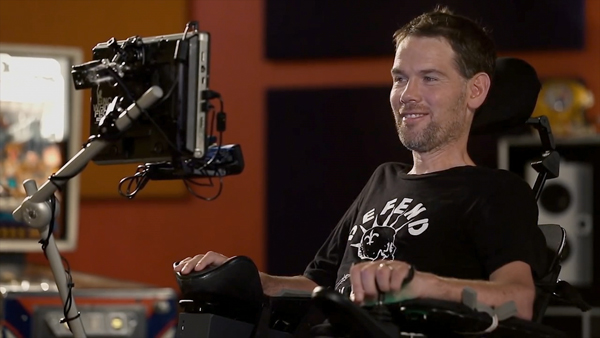The film opens with the square-jawed Steve Gleason leaving a message for his unborn son in the straightforward style of a video blog. He has the easy charisma of a world-class athlete, without any of the arrogance that usually comes with such renown. But something’s off. His speech is slow, slightly slurred, like that of someone who just woke up from a long nap. It takes visible effort to string the syllables together.
Gleason, former safety for the New Orleans Saints, is particularly beloved by his team and his city, where his decisive blocked punt became a symbol for the city’s recovery after Hurricane Katrina. Only a couple years after leaving the National Football League, he revealed that he was diagnosed with ALS, commonly known as Lou Gehrig’s disease. Halting speech is only the beginning. By the time his son learns to talk, Gleason is unsure whether he’ll be able to talk back to him—or if he’ll be alive.
Framed as a journal for the benefit of his son, Gleason is a thought-provoking documentary that tracks Gleason’s arduous struggle with ALS. Much of it focuses on his public life, including the development of his charity, Team Gleason, that advocates for those with ALS and provides them with vital equipment and services. However, the film truly shines when it focuses on the intensely personal, revealing how much the illness asks of those around him and how it can fracture even the strongest relationships. His wife, Michel Varisco, becomes caretaker to both her newborn son and her increasingly helpless husband. When she lashes out, it’s understandable. When she perseveres in spite of it all, it’s inspiring.
Gleason never becomes bitter and resentful on camera. This is no Concussion—Gleason and director Clay Tweel have no desire to place blame on the NFL for any head trauma that may have led to this disease. His father, though, is more inclined to look back, repeatedly wondering if Gleason’s younger daredevil tactics could be blamed for this debilitating illness. He also seems to be the least at peace with it, persuading his son to go to a faith healer in a heart-wrenching and awkward scene.
As the disease robs more and more of his faculties, Gleason marches on. Early on, he determines to make the most of his mobility, taking hikes into the wilderness. Later, after he’s consigned to a motorized wheelchair and has lost the ability to speak, he uses his fame to advocate for those less fortunate than him, even getting his own legislation passed: the Steve Gleason Act, requiring Medicare to provide eye-tracking equipment (made famous by Stephen Hawking) for those robbed of speech.
The film is more emotional than cerebral, and it can become overly saccharine at times. But there’s nothing simple about his father’s desire to save his son’s soul and nothing easy about Gleason’s relationship with his embattled wife. The film is ultimately a tale of remarkable resilience in the face of a tragic affliction. By the end, Gleason has more than earned the motto of his advocacy group: “No white flags.”

















Leave A Comment